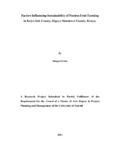| dc.description.abstract | Passion fruit farming has gained a lot of popularity among many people in Kenya. It
is grown and eaten as fresh fruit; it is sold for processing into pulp to be used in
juices, yoghurt, ice cream and other products. There are many varieties of passion
fruits. The new varieties are sweet unlike those grown in the coast region (Brazil) as
they are bigger in size, juicier and more tolerant to soil and foliar disease. Experts say
the new varieties could help lift the economic status of small holder farmers and
contribute to rapid increase in passion fruit production. The new varieties are drought
tolerant. The researcher investigated factors influencing sustainability of passion fruit
farming in Keiyo, Elgeyo-Marakwet County. The objectives of the study were; to
establish how level of knowledge influenced sustainability of passion fruit farming in
Keiyo sub county, to assess how climatic conditions influence sustainability of
passion fruit farming, to assess the extent to which Agricultural inputs influence
sustainability of passion fruit project, and to establish how market accessibility
influence sustainability of passion fruit project in Keiyo sub county. The theoretical
framework for the study was stakeholder theory advanced by Freeman. The study
targeted about 537 passion fruit farmers in Keiyo Sub County using descriptive
survey through questionnaires, interviews and observation methods. The farmers were
subdivided into three divisions: Kaptemuchwa, Kamariny and Tambach. A sample
size of 30% which was 161 of the passion fruit farmers was selected together with key
informants. The farmers were selected using stratified random sampling while key
informants were selected using purposive sampling. The study instruments involve
questionnaires and interview schedules. The research instruments were tested for
validity and reliability. Permission was sought from the Sub County Crops Officer
prior to data collection and NACOSTI. The data collected was analysed using
descriptive statistics (means and standard deviations) and inferential analysis
(correlations and regressions) with the assistance of Statistical Package for Social
Sciences (SPSS Version 20). The findings were presented using frequency
distribution tables. The findings show that there is lack of relevant skills and
competence in passion fruit farming which influenced its sustainability. The study
found out that climatic factors negatively influenced (r=0.024) sustainability of
passion fruit production. There was significant strong positive influence (r=0.546)
and p=0.001) between inputs on sustainability of passion fruit farming ,lack of
certified seeds ,inadequate land and high cost of Agricultural inputs affected the
growth of production of passion fruit. There was also a negative influence of market
accessibility (r=0.186) and p=0.041 to mean market were not accessible to all farmers.
There was lack of adequate information on the product price. The study suggests that
there is need for the county government to deploy more extension officers to all
divisions to demonstrate on best ways of cultivating passion fruit farming. Also there
is need to adopt new eco-friendly technology, and lastly the government to subsidies
on inputs. | en_US |

